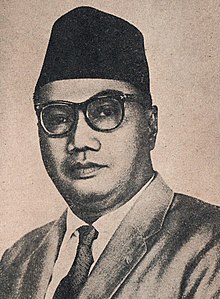Ruslan Abdulgani
| Ruslan Abdulgani | |
|---|---|

Abdulgani in 1965
|
|
| 15th Minister for Information of the Republic of Indonesia | |
|
In office 13 November 1963 – 27 August 1964 |
|
| President | Sukarno |
| Preceded by | Muhammad Yamin |
| Succeeded by | Achmadi |
| 9th Foreign Minister of Indonesia | |
|
In office 24 March 1956 – 9 April 1957 |
|
| President | Soekarno |
| Preceded by | Ide Anak Agung Gde Agung |
| Succeeded by | Subandrio |
| 1st Rector of Teacher and Education Science Institute (IKIP) | |
|
In office 2 May 1964 – 12 June 1966 |
|
| President | Soekarno |
| Preceded by | First |
| Succeeded by | Achmad Sanusi |
| Personal details | |
| Born |
November 24, 1914 |
| Died | June 29, 2005 (aged 90) |
| Nationality | Indonesia |
| Profession | Diplomat |
| Signature | |
Ruslan Abdulgani (November 24, 1914, Soerabaja — June 29, 2005, Jakarta) his first name is also spelled Roeslan) was an Indonesian government official and diplomat known for his role as a leader during the Indonesian National Revolution in the late 1940s, and as a key minister and United Nations ambassador in the Sukarno government during the 1950s and 1960s.
Ruslan was born and raised in Surabaya, East Java. He came from an upper-middle-class family; his father was a neighborhood shopkeeper and owned a small fleet of taxis. His mother, his father's second wife, was a religious tutor, giving reading and religion lessons from the Qur'an. According to a memoir of his childhood, which Ruslan wrote in the 1970s, his mother was also a strong Javanese nationalist, and it was from her that he first learned about Dutch colonial rule and the possibility of independence.
During the Indonesian fight for independence from the Dutch in the late 1940s, Ruslan was a key lieutenant under Sukarno, earning the future president's trust and ensuring him a secure place in the new government. In the 1950s he served most prominently as foreign minister, representing Indonesia abroad during the tumultuous decade when, under Sukarno's leadership, Indonesia tried to transform itself into a postcolonial, anti-imperialist success story.
Ruslan's most prominent moment as a public servant came in 1955, when he served as secretary-general of the Bandung Conference, a major meeting of African and Asian countries working to form what became the Non-Aligned Movement as an alternative to alignment with one of the Cold War superpowers. Ruslan served as Indonesia's foreign minister from March 1956 to April 1957. From July 1959 to March 1962, he was head of the Supreme Advisory Council (DPA); in October 1962 he became Minister of Information.
...
Wikipedia
